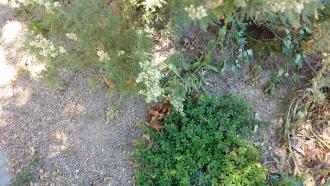pollinators and plants as stakeholders?
Submitted by Stephanie Chamberlin on Wed, 2017-07-12 00:00
So with all of the stakeholders involved in water rights and determining who gets what and where, we also have to concider the plants and the insects that pollinate them. Where do they come into the mix? So we just ignore them and let the chips fall where they may or do we try to help? Studies show that our pollinators like bees and butterflys are declining, In Jan of this year the United States placed the bumblebee on the endangered list for the first time. Canada placed them on the list in 2012. So what can we do? Today we visited a pollination garden at Roosevelt where students can learn about plants and the role these insects play in helping keep them growing. I really like the idea of helping the students understand the importance of these pollinators and educating them on the little things they can do to help them, like planting gardens designed to attract them and giving them a safe place. I really like the idea of turning even the smallest areas into gardens that can be enjoyed and cultivated.
What do you think about schools making gardens and having the students care for them? Would this be something you could get behind? What other ideas do you have for educating students about the importance of these most important insects?
I am including an article about


Comments
Gardens
I love the idea of students making Gardens and building solar powered devices and all sorts of things that kind of fit in that general idea. There is so much that can be learned in a Hands-On type of situation like that.
Everytime I hear ideas like this I get very excited, but the question becomes one of time, how much time do our students have to raise their Garden in addition to all of their other needs would the garden supply a specific bit of curriculum so that you could leave something else out to be able to do it.
I always think that the projects are great but I run into needing to give more traditional information.
Native Garden
I agree that time can be a limiting factor in teaching. The key to setting up a school garden is making it sustainable. Once all the planting is done, the garden should really take care of itself. My husband redid a chicane in front of our house. Initially it was quite a bit of work, but he planted lots of navtive plants that are now just growing on their own. He does have a watering system set up for the chicane, but most of the plants don't need that much water. I think the key is to just start small and make it an attainable goal. A teacher at our school runs the garden through his ecology club, but he does have to put in extra time.
When I got my masters I read about a school in Berekely that started an edible garden. I attached a link if you wanted to read about it more. It sounds like an fantastic program. Students are responsible for gardening, harvesting and even cooking meals. So cool!
Edible Garden
Great Idea! I found out that Vallivues highschool has veggie sales, they grow the veggies and sell them for fund raising. Both great ideas to get the most out of your gardens, and show the students the value, of gardening.
time
There is also the problem of what happens in the summer, is it self sustaining or does someone have to monitor or water during the summer. We also talked about the problems with getting maintenance to tie it into the irrigation system. This would be a lot of front loading but I think that if you planned well, it would be manageble.
Teaching time for subjects is also a great problem, It is always a challenge to get through all of the subjects expected. They have to pass the tests right?